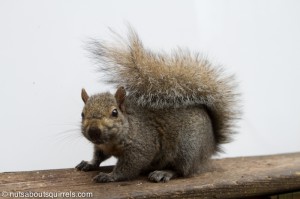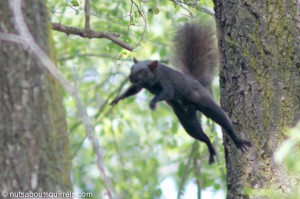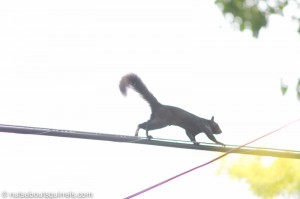Why do squirrels have bushy tails?
A squirrel’s tail is much more than a fashion accessory. It serves 3 main functions that enable the squirrel to survive: protection, balance and communication.
For example a squirrel can wrap its tail over its body to protect itself from the rain or snow. It can also wrap it around itself when sleeping to keep itself warm.
During the summer squirrels can use their tail to keep cool. By pumping more blood into its tail, the squirrel can lower its body temperature.
The other main function for the tail is as a counterbalance when leaping through the trees.
If you watch a squirrel walk along a wire for example, you will probably notice it swinging its tail from side to side to maintain its balance.
The bushyness of the tail can also function as a kind of parachute, slowing a squirrel’s descent should it fall, which does happen sometimes.
Squirrels also use their tails to communicate. By flicking its tail quickly 3 times in a row a squirrel can warn other nearby squirrels of danger, such as a predator. Other squirrels are always on the lookout for this signal, and will become more alert when they observe it. Squirrels also ‘shiver’ their tails when approaching a member of the opposite sex.
Sometimes a squirrel will lose its tail in an accident. While it makes them look kind of funny, most of them manage just fine without it. Click here for examples of squirrels that have lost their tails.










Hi there, I was watching an eastern grey squirrel nibble on some birdseed in the yard up here in New Hampshire. As he ate he would arch his tail with the tip coming to rest on the ground, something I have seen them do many times before. But as he performed this motion I couldn’t help but be faintly reminded of the shape of a large grey wolf’s paw. I then wondered if perhaps this could be a mechanism for scaring off the squirrel’s competitors, or predators who might look at a grey squirrel as a nice meal but would dash away at the sight of a grey wolf paw. In the underbrush of a forest it seems to me like it could be plausible for another animal to make this mistake at a glance. Anyone have insight or thoughts here?
Thanks
Justin
I never thought of that explanation.
Could it also be that it’s tiring to keep the tail in the air all the time?
The cooling function explains why I would see a squirrel’s tail sticking out of my attic air vent louvre! I came to this site because I thought the behavior was strange, and now I know the squirrel up there isn’t crazy; he was hot and trying to cool down. Hahahaa!